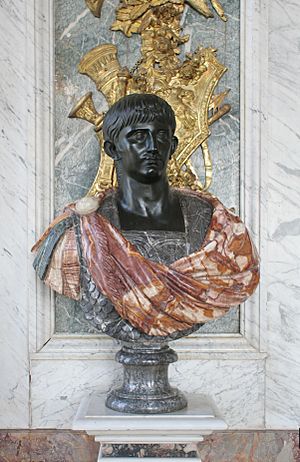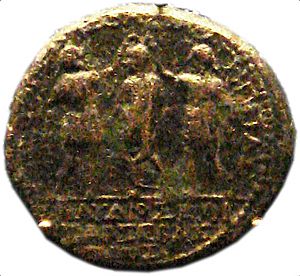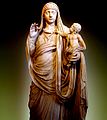Claudius facts for kids
Quick facts for kids Claudius |
|||||
|---|---|---|---|---|---|
| Emperor of the Roman Empire | |||||
 |
|||||
| Reign | 24 January 41 – 13 October 54 | ||||
| Predecessor | Caligula, nephew | ||||
| Successor | Nero, grandnephew and stepson through his niece and fourth wife, Agrippina the Younger | ||||
| Born | 1 August 10 BC Lugdunum, Gaul |
||||
| Died | 13 October 54 (aged 63) | ||||
| Burial | Mausoleum of Augustus | ||||
| Spouse | Plautia Urgulanilla Aelia Paetina Valeria Messalina Agrippina the Younger |
||||
| Issue | Claudius Drusus Claudia Antonia Claudia Octavia Britannicus; Nero (adoptive) |
||||
|
|||||
| Imperial Dynasty | Julio-Claudian | ||||
| Father | Nero Claudius Drusus | ||||
| Mother | Antonia Minor | ||||
Claudius (born August 1, 10 BC – died October 13, 54 AD) was the fourth Roman Emperor. He ruled from January 24, 41 AD, until his death in 54 AD. His family was very important in Roman history. His great-uncle was Augustus, the first Emperor. His uncle was Tiberius, the second Emperor. His nephew, Caligula, was the third Emperor. His mother's father was the famous Mark Antony.
Claudius had some physical challenges, especially with his speech and walking. Because of this, his family kept him away from public jobs until he was 38 years old. His challenges might have actually saved him from dangers during the reigns of Tiberius and Caligula. His enemies did not see him as a serious threat. He became Emperor because the Praetorian Guard insisted after Caligula was killed. At that time, he was the last adult male in his direct family line.
Even though he lacked experience, Claudius turned out to be a good leader. He was great at managing the empire and building important public works. During his time as emperor, the Roman Empire grew bigger. He also led the conquest of Britain. Claudius was very interested in law and often oversaw trials himself. However, he faced many problems in his personal life, especially with his marriages. These troubles might have even led to his death. He married four times, and none of his marriages ended well. His relative and adopted son, Nero, became Emperor after him. Sadly, Nero undid much of the good work Claudius had done.
Contents
Becoming Emperor: After Caligula's Death
On January 24, 41 AD, Emperor Caligula was killed by a large group of people who had planned it. There is no clear proof that Claudius was directly involved in the plot. However, some historians think he might have known about it. After Caligula's murder, there was a lot of confusion. Claudius went to the palace to hide. Stories say that a soldier from the Praetorian Guard, named Gratus, found him behind a curtain. The soldier suddenly declared Claudius the new Emperor. It's possible that some of the guard had already planned to find Claudius, maybe even with his agreement. They promised him protection and told him they were not seeking revenge.

The Senate quickly met to discuss how to change the government. When they heard that the Praetorians had chosen Claudius, they demanded that he be brought to them for their approval. Claudius refused, sensing it might be dangerous. Eventually, the Senate had to agree to his rule. In return, Claudius forgave almost all of Caligula's assassins.
Expanding the Roman Empire
Under Claudius, the Roman Empire grew for the first time since the reign of Emperor Augustus. During his rule, the provinces of Thrace, Judea, and three other areas were added to the empire. The process of adding Mauretania, which began under Caligula, was finished after rebel forces were defeated. Mauretania was then split into two new provinces. The most important new expansion was the conquest of Britannia (Britain).
In 43 AD, Claudius sent four legions (large army units) to Britain. Britain was an appealing target for Rome because it had valuable resources, especially mines and slaves. It was also a place where rebels from Gaul (modern France) would hide. So, Rome felt it could not leave Britain alone much longer. Claudius himself traveled to the island after the first attacks were successful. He brought more soldiers and even elephants with him.
The Senate gave Claudius a Roman triumph for his success. In the Roman Empire, only members of the imperial family were usually allowed such honors. Claudius later changed this rule for some of his generals. When the British general Caractacus was captured in 50 AD, Claudius spared his life. Caractacus lived out his days on land given to him by the Roman state. This was a very unusual outcome for an enemy commander.
Claudius also ordered a census in 48 AD. This count found 5,984,072 Roman citizens. This was about a million more citizens than the census taken after Augustus's death.
Claudius's Marriages and Family Life
Claudius married four times during his life. His first marriage was to Plautia Urgulanilla, after two earlier plans for marriage didn't work out. They had a son named Claudius Drusus. Sadly, Drusus died in his early teenage years. Claudius later divorced Urgulanilla. After their divorce, Urgulanilla had a baby girl named Claudia. Claudius did not accept this child as his own.
Soon after, possibly in 28 AD, Claudius married Aelia Paetina. She was a relative of Sejanus, an important figure at the time. Claudius and Paetina had a daughter named Claudia Antonia.
Some years after divorcing Aelia Paetina, in 38 or early 39 AD, Claudius married Valeria Messalina. She was his first cousin once removed and had close ties to Caligula's family. Soon after, she gave birth to a daughter, Claudia Octavia. A son, first named Tiberius Claudius Germanicus, and later known as Britannicus, was born just after Claudius became Emperor. This marriage ended in great sadness. Messalina's actions caused serious problems for Claudius and his rule. In 48 AD, Messalina publicly married another man, Gaius Silius, while Claudius was away in Ostia. This led to the execution of Silius, Messalina, and many people connected to her. Claudius then made the Praetorian Guard promise to kill him if he ever married again.
Agrippina the Younger: A New Empress
Despite his promise, Claudius did marry one more time. He married his niece, Agrippina the Younger.
The attempted takeover by Silius and Messalina likely made Claudius realize he needed a clear adult heir. His son Britannicus was still a young boy. Agrippina's son, Lucius Domitius Ahenobarbus (who would become Emperor Nero), was one of the last male relatives in the imperial family. Future attempts to take power might gather around Agrippina and Nero. Agrippina was already showing great ambition. So, Claudius accepted Agrippina. He later adopted the now older Nero as his son.
Nero was made a joint heir with the younger Britannicus. Nero also married Claudius's daughter, Octavia, and was heavily promoted. Nero was popular with the public because he was the grandson of Germanicus and a direct descendant of Augustus.
Death, Honor, and How History Sees Claudius
Most ancient historians agree that Claudius was murdered by poison. He died in the early hours of October 13, 54 AD. While the stories vary, almost all of them suggest his last wife, Agrippina, was behind it. Agrippina had a strong reason: she wanted to make sure her son Nero became Emperor before Britannicus could gain power.
Some historians, like Suetonius, described Claudius as physically unattractive, weak, and easily controlled by his wives and friends. However, Suetonius cannot always be fully trusted. The writings by Claudius himself that still exist show a different picture. They describe him as intelligent, scholarly, well-read, and a careful administrator who paid attention to details and justice. Because of these different views, Claudius remains a bit of an enigma (a mystery). Since a letter he wrote to the people of Alexandria was found in the last century, much work has been done to understand Claudius better and find the truth.
Claudius's Writings and Their Influence
Claudius wrote a lot throughout his life. Besides a history of Augustus's reign, his main works included a history of the Etruscans and eight books on Carthaginian history. He also wrote an Etruscan dictionary and a book about playing dice. Claudius is the last known person who could read Etruscan. His first wife was Etruscan. Finally, he wrote an eight-volume autobiography (a book about his own life).
Sadly, none of these major works have survived to today. However, they were used as sources by other historians who wrote about the Julio-Claudian family. Suetonius quoted Claudius's autobiography once and likely used it many times as a source. Tacitus might have used Claudius's writings for some of the older, more detailed parts of his historical books. Claudius is also the source for many passages in Pliny's Natural History. Pliny even mentions him by name in one of his books.
Many of the public projects started during Claudius's rule were based on plans first suggested by Julius Caesar. Some historians believe that Claudius tried to be like Caesar in many parts of his policies.
Claudius in Books and Movies
The most famous fictional stories about Emperor Claudius are the books I, Claudius and Claudius the God. These were written by the poet Robert Graves in 1934 and 1935. Both books are written as if they are Claudius's own autobiography. Graves's story suggested that newly found, real translations of Claudius's writings had been discovered. Claudius's actual surviving letters, speeches, and sayings were included in the books (mostly in Claudius the God) to make them feel more real.
Graves's two books were used as the basis for an I, Claudius TV series by the BBC. The series starred Derek Jacobi as Claudius and was shown in 1976 on BBC2. It was a huge success with critics and won several BAFTA awards. The series was later shown in the United States in 1977. The DVD release of the TV series includes a documentary called The Epic that Never Was.
Claudius has also been shown in movies several times. The movie I, Claudius (1937), directed by Josef von Stromberg, was never finished. However, Charles Laughton's performance as Claudius was considered amazing. The parts of the film that still exist were shown in the BBCtv documentary The Epic that Never Was (1965). Claudius also had smaller roles in Demetrius and the Gladiators (1954) and Caligula (1979).
Images for kids
-
Bronze head of Claudius found in the River Alde at Rendham, near Saxmundham, Suffolk (British Museum). This might have been taken from the Temple of Claudius in Colonia Victricensis during the Boudican revolt.
-
Portrait of Claudius, Altes Museum, Berlin.
-
Messalina holding her son Britannicus, Louvre.
-
Claudius shown as the Roman god Jupiter.
See also
 In Spanish: Claudio para niños
In Spanish: Claudio para niños










